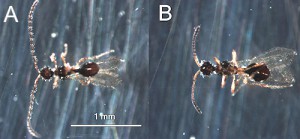We are pleased to announce a new article on Featured Creatures!
Take a sneak peek with this excerpt from the article: Trichopria columbiana (Ashmead) (Insecta: Hymenoptera: Diapriidae) is a native endoparasitic wasp (Figure 1). The wasp is a parasitoid of Hydrellia species (Insecta: Diptera: Ephidridae), with multiple implications to biological control. The hydrellia flies are a diverse group with varied ecological roles. Deonier (1971) described 57 Hydrellia species in the Nearctic region. The adults of this genus are semi-aquatic and the immatures are aquatic, feeding on aquatic and semi-aquatic plants (Deonier 1971). Of these 57 species, at least 7 have been described as hosts for Trichopria columbiana. In addition, the wasp has successfully moved from its native hosts to exotic Hydrellia species (Hydrellia pakistanae Deonier and Hydrellia balciunasi Bock) that were imported into Florida for biological control of hydrilla, Hydrilla verticillata (L.f.) Royle, which is widely regarded as one of the worst invasive weeds worldwide (Holm et al. 1997). Deonier (1971) reported that Trichopria columbiana and other parasitic Hymenoptera can negatively impact population densities of Hydrellia spp., especially in certain marginal habitats and when parasitoid population densities are high.
Figure 1. Adults of Trichopria columbiana Ashmead; male (A) with filiform or thread-like antennae and female (B) with slightly clavate or club-like antennae. Photographs by Nathan Harms, U.S. Army Engineer Research and Development Center.
Available at: http://entnemdept.ufl.edu/creatures/MISC/WASPS/Trichopria_columbiana.htm
Authors: Byron R. Coon, Argosy University, Nathan E. Harms, US Army Engineer Research & Development Center, Michael J. Grodowitz, US Army Engineer Research & Development Center, Emma N. I. Weeks, University of Florida, James P. Cuda, University of Florida
 0
0

